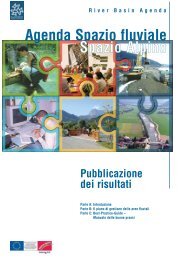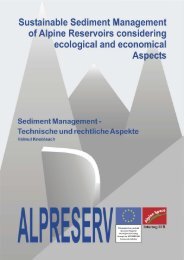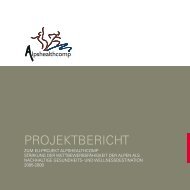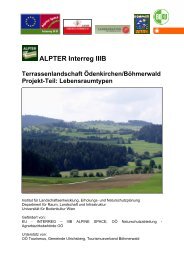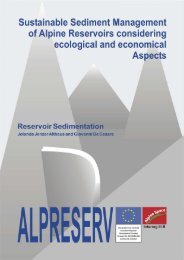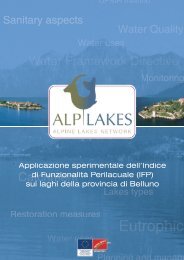WALSERSPRACHE - The four main objectives of the Alpine Space ...
WALSERSPRACHE - The four main objectives of the Alpine Space ...
WALSERSPRACHE - The four main objectives of the Alpine Space ...
You also want an ePaper? Increase the reach of your titles
YUMPU automatically turns print PDFs into web optimized ePapers that Google loves.
treatises, we must have a much more sharply tuned idiom to express <strong>the</strong><br />
rest <strong>of</strong> our individual selves and our respective cultures. If one happens<br />
to speak English as a mo<strong>the</strong>r tongue, that “different” language may still<br />
be English, but with a range <strong>of</strong> words, terms <strong>of</strong> endearment, idiomatic<br />
expressions, highly local references, as to make it nearly unintelligible to<br />
those who dealt with that same person but a moment before. If one<br />
instead is a speaker <strong>of</strong> a minority language, that different language will<br />
truly be different. It will be made <strong>of</strong> different sounds, different words,<br />
conveying different semantic fields, different scopes <strong>of</strong> individual roaming<br />
and <strong>of</strong> collective commitment. <strong>The</strong> contention that we are what we<br />
do truly falls short <strong>of</strong> its mark here, since private and ancestral languages<br />
confer on us a depth <strong>of</strong> identity that by far outstrips and exceeds that <strong>of</strong><br />
our pr<strong>of</strong>essional jargon, whichever that happens to be. Under no circumstances<br />
a pr<strong>of</strong>essional language can fill <strong>the</strong> hinterland <strong>of</strong> our private<br />
selves, which begins with childhood and unfurls through our entire lives.<br />
If we supply millions <strong>of</strong> individuals nothing but an adopted, working language,<br />
stripping <strong>the</strong>m <strong>of</strong> whatever ancestral heritage <strong>the</strong>y still had, we<br />
create <strong>the</strong> ideal conditions for collective alienation: immigrant countries<br />
like Canada and <strong>the</strong> U.S.A. know too well what that amounts to. Europe<br />
is following close up <strong>of</strong> late, and it is not only “non EU-citizens” enlarging<br />
its hosts, but Europeans <strong>the</strong>mselves, way too eager to get rid <strong>of</strong> identities<br />
<strong>the</strong>y wrongly thought to be obsolete or cumbersome.<br />
If <strong>the</strong> myth <strong>of</strong> Babel comes down to a confusion <strong>of</strong> all languages for<br />
lack <strong>of</strong> spiritual or fideistic values to keep <strong>the</strong>m meaningful and supportive<br />
<strong>of</strong> human efforts, <strong>the</strong> abolition <strong>of</strong> all languages may be equally devastating<br />
in its sole aspiration to materialistic goals, devoid <strong>of</strong> any consideration<br />
for <strong>the</strong> unworldly side <strong>of</strong> Man. <strong>The</strong>re is nothing new in humanity<br />
loosing ancestral languages to adopt <strong>the</strong> idiom <strong>of</strong> a dominant nation.<br />
In <strong>the</strong> days <strong>of</strong> <strong>the</strong> Roman empire hundreds <strong>of</strong> languages were wiped out<br />
by <strong>the</strong> relentless advance <strong>of</strong> Roman legions. But in those days adopting<br />
Latin meant also adopting a superior form <strong>of</strong> civilisation. Today adopting<br />
English does not necessarily translate into adopting a superior culture.<br />
More <strong>of</strong>ten than not, it amounts to loosing it and regretting it ever after.<br />
Its adoption bows to practicality, not to spirituality. In this connection <strong>the</strong><br />
best example that comes to mind as a model for adopting worldly languages<br />
while preserving one’s own is <strong>the</strong> one set by Saint Paul, who<br />
wrote Hebrew and spoke flawless Greek and Latin. Yet, for all <strong>of</strong> <strong>the</strong>se<br />
“<strong>of</strong>ficial” languages, his true language was a dialect, <strong>the</strong> same spoken by<br />
most Jews in those days, Aramaic. Had he given up Greek or Latin he<br />
would loose his uphill fight to bring Christianity to <strong>the</strong> gentiles, had he<br />
8




